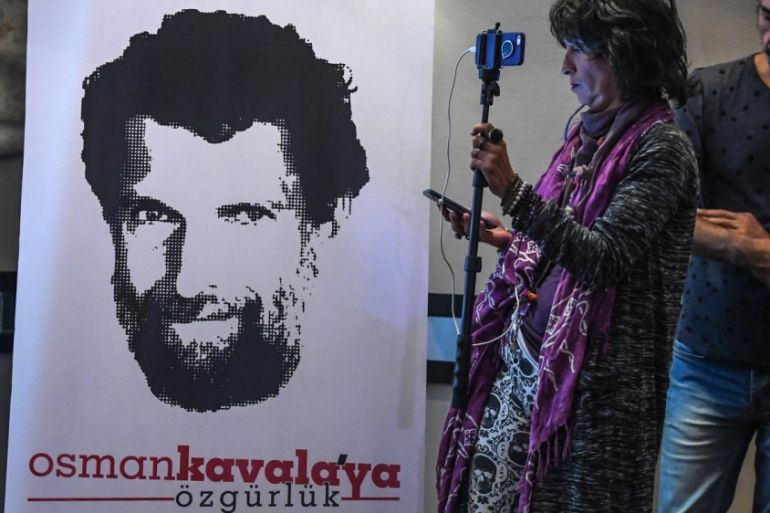Turkey: Osman Kavala re-arrested hours after acquittal
New warrant in relation to 2016 coup bid comes on same day Kavala was acquitted for accusations over Gezi Park protests.

Turkish businessman Osman Kavala has been detained by police for alleged links with a 2016 failed coup, according to state media, hours after he was acquitted for his alleged role in the Gezi Park protests of 2013.
Turkey’s state-run Anadolu Agency said late on Tuesday prosecutors had accused Kavala of “attempting to undermine the constitutional order” in relation to the coup attempt blamed by Ankara on Fethullah Gulen, a religious leader who lives in self-imposed exile in the United States, and his group. Gulen denies the charges.
Keep reading
list of 3 itemsTurkey seeks life term for suspects over 2013 Gezi Park protests
Trump, Turkey call on Russia to stop backing Syrian ‘atrocities’
The fresh detention request by Istanbul prosecutors came as scores of people including MPs, other defendants and supporters were waiting for Kavala to be released at a roadside restaurant near the Silivri prison complex where he was held.
In court earlier on Tuesday, applause erupted and some people cried in disbelief when the acquittal was announced.
A guilty verdict had been widely expected in the case, but Kavala, also a prominent philanthropist, was ordered to be set free after more than two years in jail. The European Court of Human Rights in December demanded his immediate release, saying there was a lack of reasonable suspicion that he had committed a crime.
In 2013, hundreds of thousands marched in Istanbul and elsewhere in Turkey against plans approved by Recep Tayyip Erdogan, the country’s prime minister at the time and current president, to build a replica Ottoman barracks in the city’s Gezi Park.
Eight young protesters and a police officer were killed and 5,000 people were injured in the unrest that posed a major challenge to Erdogan.
Following Tuesday’s acquittal, Industry Minister Mustafa Varank condemned the Gezi protests as a “betrayal” that had damaged the country democratically and economically.
Kavala and two other defendants had been facing life sentences without parole, while the other six defendants were accused of aiding them in attempting to overthrow the government by organising the protests. All denied the allegations. Only Kavala had been kept in custody while the trial proceeded.
At one point in Tuesday’s court session, police scuffled with defence lawyers who tried to prevent them forcibly removing a lawyer who had repeatedly requested permission to speak.
Turkish judiciary criticised
The cases of seven further defendants, who are abroad and were being tried in absentia, were separated but arrest warrants for them were lifted. One lawyer said they were also expected to be acquitted.
Critics of Erdogan’s government have questioned the independence of Turkish courts, especially since a sweeping security crackdown following the 2016 coup attempt. Erdogan and his Justice and Development (AK) Party say the judiciary makes independent decisions.
In his defence, Kavala pointed to the European Court of Human Rights decision demanding his immediate release and had described as a “conspiratorial fiction” the idea that the protests were an attempt to overthrow the government.
A court previously acquitted people prosecuted over the 2013 protests, with a judge ruling in 2015 they were exercising the right of freedom of assembly. But in 2017 Kavala was arrested and the following year police rounded up the other 15 defendants including civil society figures, writers and actors.
The prosecutions were part of a crackdown that Turkish authorities said was necessary on security grounds. It has involved widespread purges of the armed forces, ministries and state organisations.